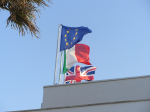
The Mayor of London, Sadiq Khan, and Michael R. Bloomberg are today announcing a joint investment in air quality monitoring worth almost £1.5m, to help ensure London’s recovery from the
coronavirus pandemic is green and clean.
The combined investment – including £779,000 from Sadiq and £720,000 from Bloomberg Philanthropies - will fund the day-to-day running of 195 air quality sensors across the capital, as well as further research and community engagement until November 2024.
From today, data from the sensors – installed at hospitals, schools and in local authorities to measure pollution locally – will produce real-time air quality data that Londoners can access on the new Breathe London website.
The website will - for the first time - bring together the data from London’s existing monitoring network alongside Breathe London sensors, meaning once all the sensors are in operation it will host data from over 300 monitoring sites.
The Mayor also announced today a new sponsorship programme in partnership with Bloomberg Philanthropies and Imperial College London, providing an additional 60 sensors available to London communities over next three years. Organisations and individuals will be able to apply to host a sensor in a location of their choice from the summer, with all associated costs covered. The first 10 sensors will be released in the autumn.
Breathe London will focus on reaching communities that research shows are exposed to poor air quality and lack access to green space, including low-income and Black, Asian and Minority Ethnic groups. As part of the Breathe London project and supported by the Mayor of London, Bloomberg Philanthropies is also helping to fund a community project in Newham. Greener Together, a pilot project which aims to address environmental inequality linked to social and racial injustices in London, looks at building better relationships between local government and civil society. The project team will work with residents to find environmental solutions to local issues most affecting the community, such as poor air quality.
As part of the Breathe London project, sensors have already been installed at several hospitals across the capital. Community groups, charities, businesses, individuals, academics and boroughs are being encouraged to host a sensor in their area. Each London borough will receive at least one sensor and will work with their local communities to choose the locations.
In addition to the Breathe London sponsorship programme, community groups, charities, businesses, individuals, academics and boroughs will also be able to ‘buy in’ to the network at a reduced cost. The sensor network will significantly reduce the costs of sourcing reliable air pollution data for local projects or schemes like School Streets. In the past this has been prohibitively expensive, often leaving communities with no data, or worse - extremely inaccurate data with no quality control. Details about how to apply through the sponsorship programme or to buy into the network will be announced in the summer.
The work of the Breathe London network forms a vital part of supporting a green recovery from the coronavirus pandemic by tackling environmental and health inequalities.
The Mayor of London, Sadiq Khan, said: “I am delighted that Londoners will now have access to real-time, accurate air quality data for their area from more than 300 monitoring sites. This will improve awareness and help people reduce their exposure to polluted air.
“The new website we are launching today will also help City Hall, TfL and the boroughs better target efforts on improving air quality at a local level. Thanks to support from Bloomberg Philanthropies we will be helping community organisations to monitor air pollution by enabling them to host sensors in a location of their choosing at no cost to them.
“As we look towards a recovery from the coronavirus pandemic, it is vital that we create a city that is cleaner and greener. Never has tackling London’s toxic air been more important, which is why I am taking these bold and innovative steps to improve it. But I can’t do this alone. Now, we need Government to step up and match my ambitions. If they give cities the powers and funding needed, we will be able to make air pollution a thing of the past.”



































